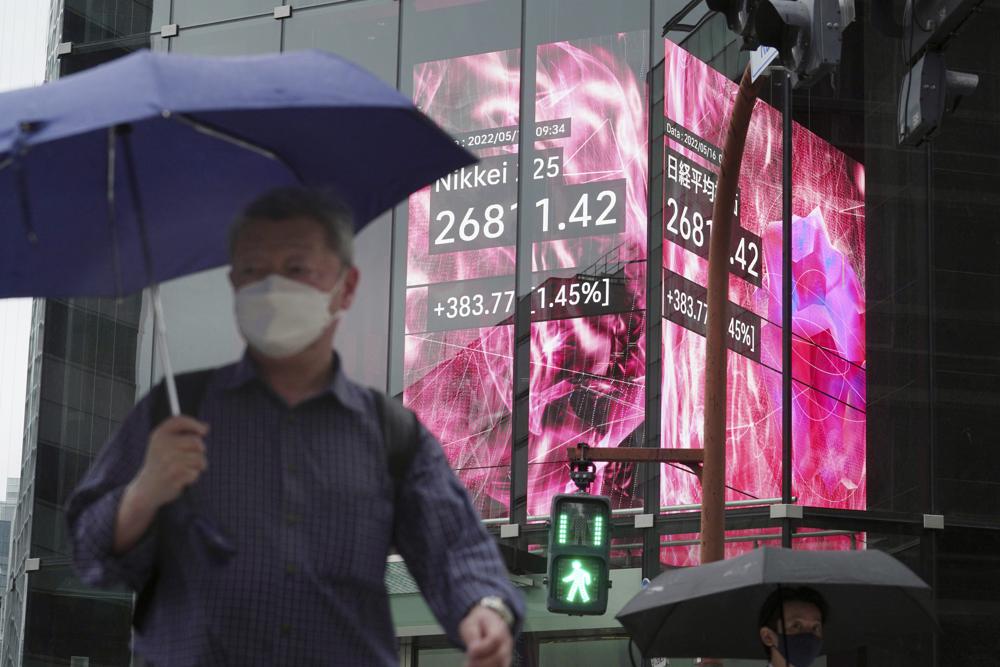

Asian shares mostly rose Monday, as investors eyed surging energy costs and prospects for interest rate hikes in the U.S.
Benchmarks edged up in Japan, Australia, and South Korea. Shares rose in Hong Kong but declined in Shanghai.
Some analysts worry that if the U.S. Federal Reserve raises interest rates too quickly, or by too much, that could set off a recession. A slowdown in the U.S. would almost certainly hurt the Asian region, which exports and manufactures goods for the U.S. economy.
The Fed has said it will continue to raise interest rates to temper rising inflation. The benchmark short-term interest rate was at a record low of near zero during much of the coronavirus pandemic.
“Many others had spotted recession risk out in 2024, but we have been aggressive from the outset in our forecast for a potential U.S. recession this year,” said Clifford Bennett, chief economist at ACY Securities.
Japan’s benchmark Nikkei 225 gained 0.5% in afternoon trading to 26,552.63. SoftBank Group’s stock rose despite reporting hefty losses on its investments last week. Retail chain Uniqlo also rose after falling in previous weeks on worries about virus lockdowns in China.
In other regional trading, Australia’s S&P/ASX 200 edged up 0.3% to 7,093.00. South Korea’s Kospi was little changed inching up less than 0.1% to 2,605.48. Hong Kong’s Hang Seng recouped morning losses to rise nearly 0.1% to 19,915.74, while the Shanghai Composite shed 0.6% to 3,066.48.
Even if concern over interest rate increases has been allayed somewhat, investors are still watching closely for what Fed Chairman Jerome Powell might say next, said Stephen Innes, managing partner at SPI Asset Management.
“That does not mean the bear market is over, especially with the recession on everyone’s mind,” Innes said.
Wall Street ended last week with a broad rally, but the market still recorded its sixth straight weekly drop, the longest such streak since 2011.
The S&P 500 rose 2.4% to 4,023.89. The index is now down 15.6% for the year. The Dow gained 1.5% to 32,196.66, while the Nasdaq rose 3.8% to 11,805. Smaller company stocks also staged a solid rally. The Russell 2000 gained 3.1% to 1,792.67.
Although some technology shares rose, Twitter fell 9.7% Friday, after Tesla CEO Elon Musk said he was putting his deal to acquire the social media company on hold. Tesla rose 5.7%.
The upcoming round of corporate earnings may provide insights into how inflation is affecting businesses and consumers. Several major U.S. retailers report results later this week, including Walmart, Target, and Home Depot.
Markets have slumped since late March as traders worry the Fed may not succeed in its delicate mission of slowing the economy to rein in the highest inflation in four decades without causing a recession.
In energy trading, benchmark U.S. crude lost $1.41 to $109.08 a barrel in electronic trading on the New York Mercantile Exchange. It jumped from $4.36 to $110.49 on Friday. Brent crude, the international standard, fell from $1.79 to $109.76 a barrel.
In currency trading, the U.S. dollar edged down to 128.97 Japanese yen from 129.28 yen. The euro cost $1.0401, inching down from $1.0402.